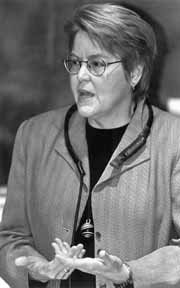
| ||
 | ||
 Muriel V. Roscoe lecturer Charlotte Bunch PHOTO: CLIFF SKARSTEDT |
Human rights battles are being lost
|
SYLVAIN COMEAU | The worldwide struggle for women's rights has never been about special interests or the battle between the sexes. In a lecture at McGill last Tuesday, Charlotte Bunch, founding director of the Douglass College Center for Women's Global Leadership, argued passionately that women's rights are, and should be, a universal humanitarian concern.
"It might seem fairly obvious, if not actually redundant, to say that women's rights are human rights; after all, women make up half of humanity. But it has been a long struggle during this decade to get people to recognize that the specific kinds of ways in which the human rights of women are violated are equal to fundamental human rights issues." According to Bunch, that shift in perspective on what constitutes human rights is more than a mere intellectual exercise; it is a redress of subtle discriminatory thinking. "The separation that we used to have between women's rights and human rights was really a reinforcement of the secondary status of women. The notion that women's rights were somehow separate from human rights was a codification of the belief that women were still second-class citizens. "In many ways, the 'women's rights are human rights' movement is a culmination of what the women's movement has been doing for the past century and a half." Bunch has championed feminist causes for three decades, and was inducted into the National Women's Hall of Fame in Seneca, New York, in 1996. The aim of her organization is to convince governments and other international bodies to take a fresh look at the issue of human rights. "We have to start looking at the world through women's eyes; how are human rights, peace and development defined from the perspective of the lives of women? It's also important to look at the world from the perspective of diverse women, because there is no single women's view, any more than there is a single men's view. "I never hear people say, 'Why don't all men agree?' Yet, they continually ask me, 'Why don't all women agree?' Well, why should half the population have to agree on anything in order to have it taken seriously? My perspective is not to get all women to agree, but to get all women's voices in the debate." Bunch argues that a number of issues have to be added to the human rights agenda, because women suffer disproportionately from certain kinds of abuses. "Women's human rights are the ones which have been left out until recently, because they affected women primarily, or exclusively. For example, reproductive rights issues, domestic violence, female genital mutilation and forced pregnancy and rape in war time simply were not on the human rights agenda in the past. "This is simply a matter of reinterpreting the principles embedded in the Universal Declaration of Human Rights, in order to understand that torture happens in the home, and that it's still torture even if the state isn't doing it. The state has an obligation to prevent that torture, whether it is being done by a right wing death squad in Latin America, or by a member of someone's family." In addressing human rights violations, NGOs and governments cannot be entirely successful unless they also attack the problem of gender-specific abuses. "We are asking people to understand that slavery still exists today; in fact, according to a recent New York Times article, if you count the number of women and children in bonded labour, domestic slavery or sexual slavery today, there are more slaves in the world than at any other time in history. "We want people to realize that much of the rape in the world today is a form of terrorism; it is used as a method of keeping women off the street, out of the bars, out of the factories, or anywhere else men don't want women to go. It is used as a way of keeping women in their place." Bunch hopes that her organization's philosophy will help counter some of the backlash against feminist causes, which have been labelled a "special interest" in many quarters, along with other social and community groups. "This is an example of how we've lost the battle of the terms. I remember when 'special interests' meant corporations -- some kind of corporate influence. Somehow, over the last 10 years, special interests has been shifted to mean the people. "For example, lesbian and gay rights battles have been lost because opponents say, 'They shouldn't get special rights.' But these 'special rights' are just access to the same rights everybody has. That language is used to mean that whenever any group advocates for itself, it's somehow a special plea over and against other groups. That has been a very effective manipulation of language, and we have to counter that manipulation." Bunch acknowledged that many groups have left themselves open to such charges by adopting a single cause and failing to form alliances. "That language has been successful because too many women's groups have worked in single issue ways, without speaking enough about how that issue related to others. Groups can help their cause by showing that they are lending their support to other struggles." Bunch's lecture was presented by the McGill Centre for Research and Teaching on Women. The Muriel V. Roscoe Lectureship was established 10 years ago as a centennial project by the Alumnae Society, in honour of the second woman to be named a full professor at McGill.
|
|
| |||||